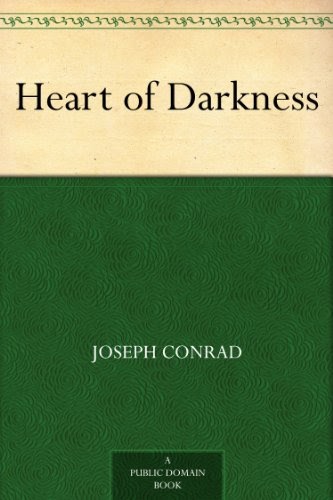As research for a travel book about India and Nepal, I’m reading a whole bunch. I figure I might as well post some short reviews of these books as I finish them.
Conrad, Joseph, Heart of Darkness (1899)
I first read Heart of Darkness in high school and didn’t get it. This may have something to do with its intentional vagueness, or with the fact that I’d never been outside the US to experience the dislocations that come with encountering an alien environment and culture. Not incidentally, this was also the first book I read after I started getting high every day, so there’s that.
I read it again late in my trip to India (still stoned), and then I felt it in my bones. My little tourist sojourn , riding in buses and trains and sleeping in hotels, had generated a shocking amount of rage and frustration in me. I was nowhere near “Exterminate the brutes,” but I could see how one would get there. I faced no great risks, ate restaurant meals, and had just completed a liberal arts education specifically designed to imbue me with a sense of shared humanity, and how many times had a combination of heat, exhaustion, mild illness, and culture shock driven me to screaming into the face of some person who made less money in a year than I was carrying in my money belt? And screaming at them because they were doing it wrong, whatever it was: preparing food, or overcharging me for something, or taking me to the wrong place. My tantrums were grotesque, and I knew they were, but I didn’t always have complete control over them. I could see how for Kurtz and men like him, under conditions far more extreme, the path from tantrums to mass murder was not a long or difficult one. I didn’t really hold myself above that either. Set the conditions, and any of us may turn out to be a monster.
Now, reading it yet again decades later, it still holds its power, though it’s less shocking than it once was. I don’t really buy the critiques, most famously from Chinua Achebe, that the book is a racist, colonialist depiction of Africa as the Dark Continent. It’s a book about racism and colonialism, deeply skeptical and with a fierce, burning anger at the supposedly civilized and civilizing forces of Europe that fired cannons into the forest and enslaved and starved the Africans they were supposedly saving. There is no Kiplingesque celebration of the white man’s burden to be found in Heart of Darkness. The name itself is a redirecting of the “darkest Africa” trope toward Kurtz’s dark heart, his hollowness, the dark heart of the whole European enterprise.
Heart of Darkness had a profound effect on me when I read it in India, clarifying a dangerous and ugly strain in my own mind — my own heart of darkness. It’s a book that holds up, a rare critical voice from the highwater period of European colonialism, published two years before Kipling’s Kim but seeming more contemporary to Orwell. Well worth a read now, especially if you’ve ever been angry and flustered in a place that was not your own.
Also published on Medium.

